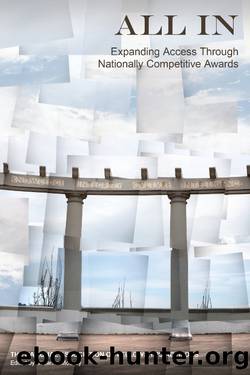All In by McCray Suzanne;

Author:McCray, Suzanne; [McCray, Suzanne]
Language: eng
Format: epub
Tags: EDUCATION / Educational Policy & Reform / General
ISBN: 2007812
Publisher: University of Arkansas Press
Published: 2013-08-16T00:00:00+00:00
Ethics and the Application Process
AN HONOR CODE FOR STUDENTS
Student cheating at universities across the country is problematic. According to recent studies, nearly two-thirds of all students say they have cheated at some time during their careers.4 According to a New York Times article by Richard Perez-Pena, students cheat because it is easy and goes relatively unpunished. In it he interviews Donald McCabe, a well-known researcher on cheating patterns, who concludes that pressures and fierce competition have caused students âto excuse more from themselves and other students, and thatâs abetted by the adults around them.â McCabe continues, âThere have always been struggling students who cheat to survive, but more and more, there are students at the top who cheat to thrive.â5
There is no more intensely pressured environment than national award competitions. Advisors may assume that their students would never cheat or that they could never cheat, since a personal statement cannot be plagiarized. In the fall of 2010, however, Adam Wheeler, a then senior at Harvard, had the audacity to do exactly that. He had been lying and cheating for years at and about various institutions, but he did not get caught until he submitted a Fulbright and a Rhodes application to his resident dean for endorsement.6 The level of fraud in this studentâs career was stunning and unusual, even when considering national statistics on cheating in college. His résumé looked impressive, but it was based on dishonestly achieved gains. If Professor James Simpson had not recognized that the prose was nearly word for word from his colleague Stephen Greenblatt, Wheeler may have been shortlisted for the Rhodes.7
What happened at Harvard was, of course, unusual. Wheeler was guilty of misrepresenting himself long before he arrived there. Even while on probation, with the threat of prison to dissuade him, he sent out a fraudulent résumé for a nonpaying five-hour-per-week internship.8 He is not the student we normally have to guard against, but his behavior did create a discussion on campuses about how to safeguard our admissions processes and how to make sure that studentsâ résumés reflect work they have actually done.9 Advisors probably do not need to be on the outlook for Adam Wheelers. Most advisors will work their entire lives and never meet such a person, but advisors should still remember the case, understand that it is possible that variations of his behavior could happen at any institution, and be on the outlook for exaggeration, for padding, and for misrepresentation should they occur. Many students accept spin as a part of doing business. Advisors need to ask questions of a student or of others if an application looks too good to be true.
The NAFA Code of Ethics makes clear that students âshould ensure that all application materials, including but not limited to personal statements, résumés, proposals, essays, shall be the sole and original work of the applicant,â citing paraphrased material and providing sources.10 Students should also be encouraged to delete any activities in which they had no real substantive involvement. Exaggeration in this context is fraud, and of course, it is lying in any context.
Download
This site does not store any files on its server. We only index and link to content provided by other sites. Please contact the content providers to delete copyright contents if any and email us, we'll remove relevant links or contents immediately.
Chicken Soup for the Soul Presents Teens Talkin' Faith by Jack Canfield(636)
Understanding PDA Autism in Kids: A Guide for Parents and Teachers to Support Neurodiverse Learners by Jehu Len(553)
The Victorian Era: A Captivating Guide to the Life of Queen Victoria and an Era in the History of the United Kingdom Known for Its Hierarchy-Based Social Order by Captivating History(422)
Brain Teasers to Build Critical Thinking Skills by Safarova Kris(411)
Brain Teasers to Build Critical Thinking Skills: Brain Exercises for Tech, Banking, Case Interview Prep, and to Keep Your Mind Sharp by Kris Safarova(411)
100 Ideas for Secondary Teachers: Engaging Parents by Janet Goodall & Kathryn Weston(386)
Python 101 - Fundamentals by Sam(373)
Critical Curriculum Leadership : A Framework for Progressive Education by Rose M. Ylimaki(360)
Writing Solid Code: Development Philosophies for Writing Bug-Free Programs by Steve Maguire(356)
The Art of Emotional Validation: Improve Your Communication Skills and Transform Your Relationships by Validating Emotions and Feelings by Emily Wright(338)
Intersectionality in Educational Research by Dannielle Joy Davis; James L. Olive; Rachelle J. Brunn-Bevel; Susan R. Jones(331)
The Knights Templar: An Enthralling History of the Rise and Fall of the Most Influential Catholic Military Order by Wellman Billy(327)
A Beginner's Guide to SSD Firmware by Unknown(326)
The Future Knowledge Compendium by Ellyard Peter;(319)
How to be assertive in any situation by Hadfield Sue & Hasson Gill(309)
Making Connections in and Through Arts-Based Educational Research by Hala Mreiwed Mindy R. Carter Sara Hashem Candace H. Blake-Amarante(305)
Foundations of Educational Research by Victoria Elliott(305)
What Every Teacher Should Know about Learning, Memory, and the Brain by Tileston Donna E. Walker;(305)
Message from the Pleiades; The Contact Notes of Eduard Billy Meier v1 only by unknow(301)
